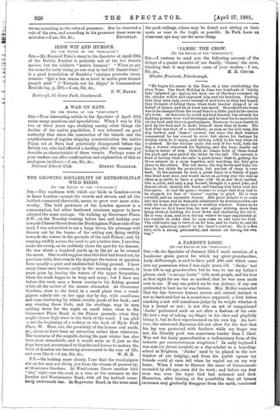THE GROWING SOCIABILITY OF METROPOLITAN WILD BIRDS.
(TO THE EDITOR OF TIIE "SPECTATOR."] Sin,—The readiness with which our birds in London—even in Inner London—accept the crowds and streets, and all the hubbub connected therewith, seems to grow ever more note- worthy. The bold perkiness of the London sparrow is a commonplace, but other feathered creatures appear to have adopted the same courage. On w'alking up Grosvenor Place, S.W., on the Tuesday evening before last, and looking over towards Chester Street from the Buckingham Palace side of the road, I was astonished to see a large heron, his plumage well thrown out by the beams of the setting sun, flying swiftly towards the waters in the grounds of the said Palace; and, by running swiftly across the road to get a better view, I saw him make his sweep, as he suddenly chose the spot for his descent. He was about a hundred yards up in the air as he crossed the street. One would suppose that this bird had found out, by previous visits, that even in the daytime the waters in question form usually a quiet and undisturbed fishing ground. I have many times seen herons, early in the morning in summer, in years gone by, leaving the waters of the upper Serpentine, when the roads began to be busy and noisy; but I have not before this week seen a heron coming to his fishing ground while all the racket of the streets abounded. At Grosvenor Gardens, close to the hotel, in a small plane tree, a wood- pigeon calmly sits on her eggs day by day, with omnibuses and vans lumbering by within twenty yards of her beak; and any evening these birds, and the starlings, may be seen settling down for the night on small trees, close to the Grosvenor Place Road, in the Palace grounds, when they might choose high trees in the thick of the wood. I am glad :o see the beginning of a rookery at the back of Hyde Park Place, W. Here, too, the proximity of the houses and yards, &c., seems to have been an attraction rather than otherwise. The tameness of the seagulls during the past winter has also been most remarkable, and it would seem as if, just as the dogs have got accustomed to bicycles andliorses to motors, the birds of London are becoming accustomed to the roar of life,
and even like it.-1 am, Sir, &c., W. H. B. .
P.S.—On looking more closely, I see that the wood-pigeon sits on her nest not thirty feet from the stream of passers-by, at Grosvenor Gardens. At Westbourne Grove another bird "sits," right over the road, in a tree at the entrance to the London and Westminster Bank, with all the hubbub cease- lessly underneath her. In Bayswater Road, in the trees next the park railings, others may be found now sitting on their nests as near to the traffic as possible. In Park Lane an observant eye may see the same thing.






















































 Previous page
Previous page